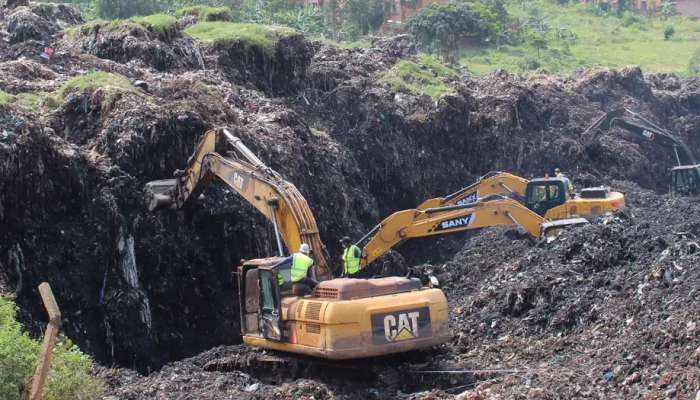
Kampala: Zamhall Nansamba stands in front of her house in Kiteezi, a suburb of Uganda's capital Kampala, her 1-year-old son in her arms. Flies buzz around her, and the smell of garbage fills the air. Her flip-flops keep her feet just above the muddy dirt floor.
One year ago, on August 9, 2024, an avalanche of rubbish from the adjacent landfill almost buried Nansamba's family and her home.
The mother of two says she was extremely lucky. "I got up early that morning to do the housework," she recalls.
"When I heard a noise I went outside. I saw the trees and the rubbish coming," she says, her lips trembling. "I grabbed my two children and we ran."
The 31-year-old points up at a huge mountain of waste —Kampala's municipal landfill — towering above her detached house. Last August, tons of waste thundered down the slope and buried more than 70 houses. Thirty-four bodies were recovered, more than 20 people are still missing and some 220 residents were left homeless. Later, officials said a methane explosion triggered the landslide.
That day completely changed life for Nansamba's family. When she returned to see if her house was still standing, she found the building intact, but many others destroyed and the cows in the neighboring meadow were all dead.
"Some of the people lost their property, lost their lives," she tells DW. "Until now, we are living a miserable life. We had rental apartments down there, and I was able to pay my children's school fees with the income from those apartments."
What happens now with Kampala's waste?
Immediately after the disaster, the Kampala Capital City Authority (KCCA) told residents living near the landslide to move over the risk of further collapse. But families like Nansamba's, who live in this poor neighbourhood on Kampala's northern outskirts, have no money to settle elsewhere.
Fear of another potential landslide keeps her awake at night, says Nansamba. Her husband is undergoing psychiatric treatment.
"We are all traumatised," she says.
Immediately after the landslide, the KCCA closed the landfill in Kiteezi, where all the waste from the 2-million-strong metropolis has been piling up unsorted for over 27 years.
City spokesperson Daniel Nuweabine told DW the Japanese government recently provided $1 million (about €860,000) in funding to secure the landfill, flying in machinery and Japanese engineers. Work included compressing about 500,000 tonnes of waste.
"This is a huge task. These are high-risk areas where methane gas is present in the ground and the pressure can open cracks and easily trigger further avalanches," said Nuweabine.
The Kiteezi landfill is now officially closed. But where do the 2,000 tons of waste go that Kampala produces daily?
Nuweabine said the KCCA bought 90 hectares of land in Buyala, 27 kilometres (16.7 miles) west of Kampala, in March to build a new landfill.
The municipality has big plans for processing the city's waste, he said, Those include a composting project to create biogas. An estimated 80% of household trash is compostable biowaste, composed mainly of organic matter, because Kampala residents rarely eat processed food. The rest could be recycled, Nuweabine said.
In early 2024, the German Chamber of Commerce Abroad held a conference in Kampala on the circular economy and waste processing, with companies such as Siemens listening to the Environment Ministry's plans to recycle more materials — still a rare process in Africa. Uganda's new landfills won't just be dumping grounds, but will also be recycling centres.
New dumping ground proves controversial
But so far, the idea lacks investors and funding. Unsorted waste is still being dumped in Buyala, which remains controversial, according to Aldon Walukamba, spokesperson for Uganda's National Forestry Authority.
"To our knowledge, this is still a forest reserve," Walukamba told DW. "It is located in the catchment area of the Mayanja River, a key contributor to Lake Victoria and its biodiversity ecosystem."
But, he added, "we found that indeed some garbage had been dumped."
When Walukamba went to the area himself in December 2024, soldiers and police officers were on site.
In Uganda, the parliament and president must give their approval before forest reserves can be released for other uses.
"This wasn't done," said Walukamba. He suspects the city administration and the previous landowners worked together "hastily and illegally" to secure the sale of the land.
The controversy has sparked several court cases. The KCCA insists the land near Buyala, where garbage is now being dumped, belonged to two private individuals from whom KCCA legally acquired the land in March.
A court ordered an investigation into whether it was a reserve. "The report found the land in question is not part of the forest reserve," said KCCA spokesperson Nuweabine.
Back in Kiteezi, the victims of the landslide that kicked everything off are still waiting for compensation to allow them to live somewhere safe.
Speaking with DW, Nuweabine said that just recently a cabinet meeting had drafted a memorandum and an order had been issued to the relevant Finance Ministry to pay victims.
"The people shall be compensated," he said.